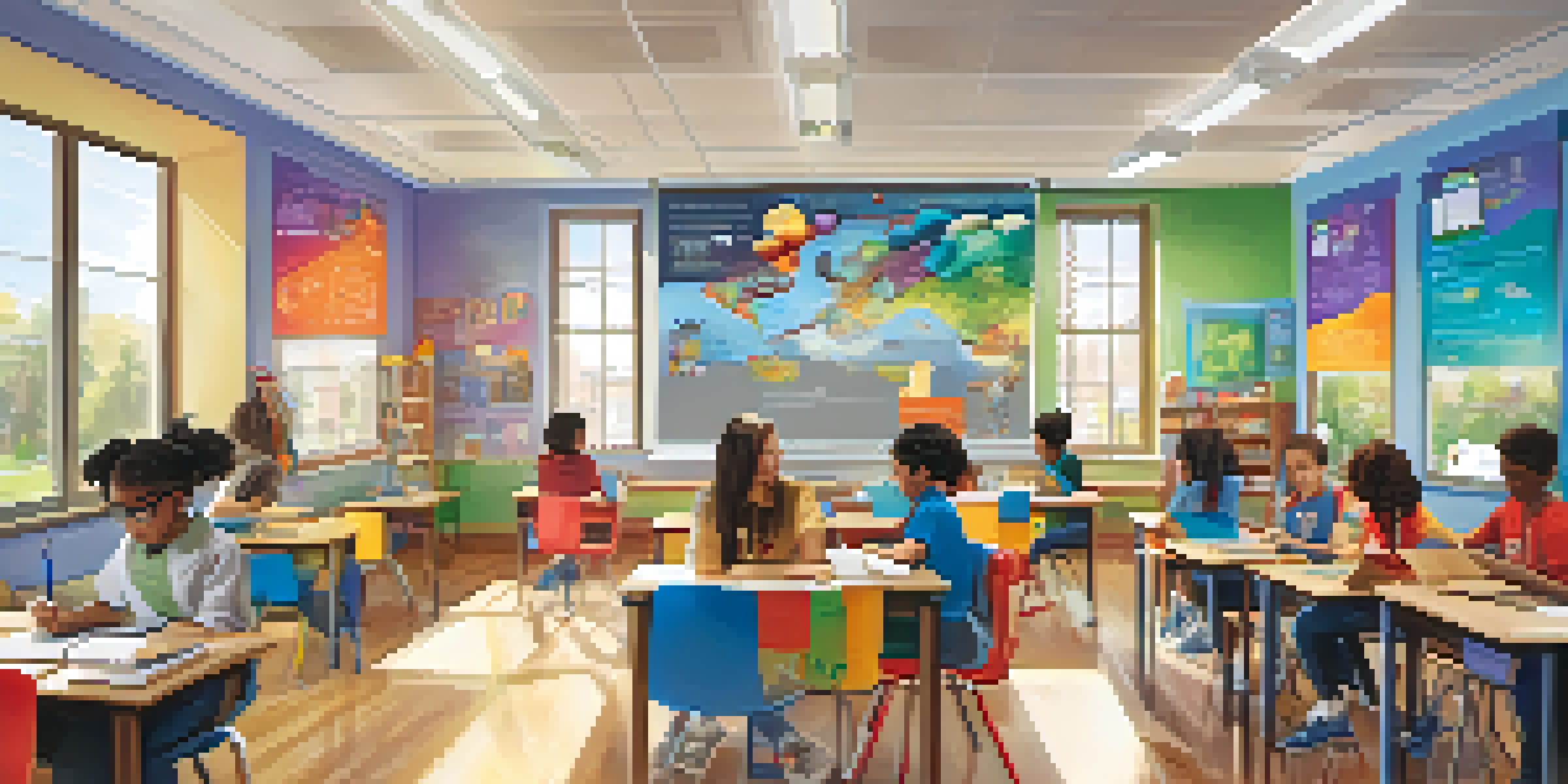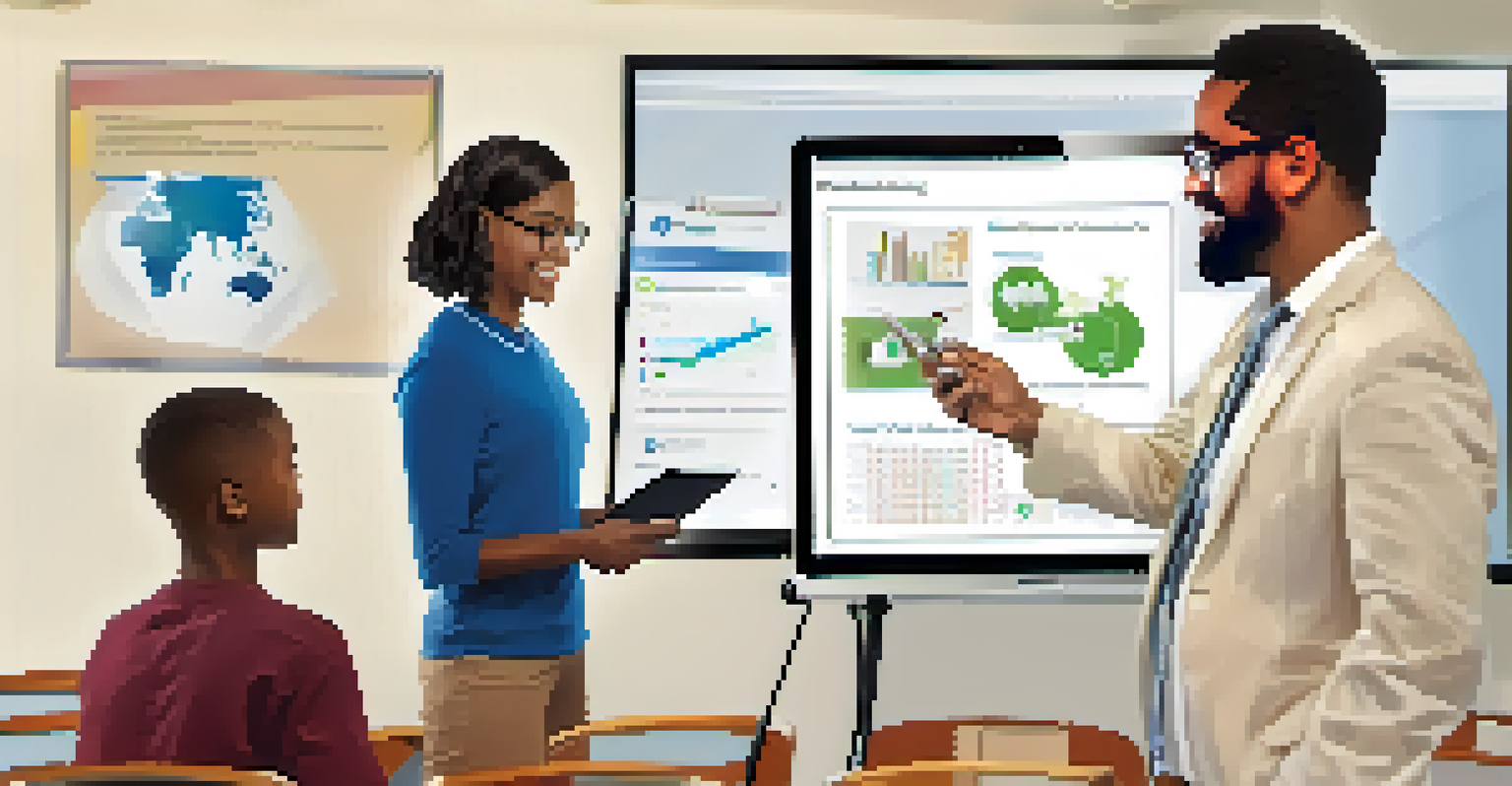California's Personalized Learning Models: A New Approach

Understanding Personalized Learning in Education
Personalized learning is a tailored educational approach that focuses on individual student needs, strengths, and interests. Unlike traditional methods that apply a one-size-fits-all strategy, personalized learning allows educators to customize the curriculum for each student. This model recognizes that every learner is unique, which can lead to a more engaging and effective educational experience.
Personalized learning is not a trend; it’s a commitment to meeting the unique needs of every student.
In California, personalized learning has gained traction as schools seek solutions to address diverse learning styles. For instance, some students may excel with hands-on projects while others may prefer digital resources. By accommodating these differences, educators can create a more inclusive academic environment that promotes success for all students.
Moreover, personalized learning often involves leveraging technology, such as adaptive learning software, to track student progress. This data-driven approach helps teachers identify areas where students may be struggling, allowing for timely interventions. As a result, personalized learning not only enhances student engagement but also improves overall performance.
California's Approach to Personalized Learning Models
California has been at the forefront of implementing personalized learning models, with various school districts adopting innovative strategies. For example, schools in Los Angeles have introduced blended learning environments, where students can learn at their own pace using a mix of online and face-to-face instruction. This flexibility empowers students to take charge of their learning journeys.

Another notable example is the use of Individual Learning Plans (ILPs) in California schools. These plans are developed collaboratively between students, teachers, and parents, outlining specific goals and strategies tailored to each learner. By involving students in this process, the education system fosters a sense of ownership and responsibility for their academic success.
Personalized Learning Boosts Engagement
By tailoring education to individual student needs and interests, personalized learning significantly enhances student motivation and involvement.
Additionally, California's focus on equity is a crucial aspect of personalized learning. The state aims to ensure that all students, regardless of background or socioeconomic status, have access to high-quality personalized education. This commitment is reflected in funding initiatives and resources aimed at supporting schools in effectively implementing these models.
Benefits of Personalized Learning for Students
Personalized learning offers numerous benefits that can significantly enhance a student's educational experience. One of the most notable advantages is increased engagement. When students have a say in their learning process and work on subjects that interest them, they are more likely to stay motivated and invested in their education.
The future of education must be rooted in personalization and student engagement for all learners.
Another benefit is improved academic performance. Personalized learning allows students to progress at their own pace, which means that they can spend more time mastering challenging concepts before moving on. This tailored approach can lead to higher test scores and a deeper understanding of the material, ultimately setting students up for success in future academic pursuits.
Moreover, personalized learning fosters critical thinking and problem-solving skills. By encouraging students to explore topics of interest and pursue their passions, this model cultivates a love for learning that extends beyond the classroom. Students become active participants in their education, which prepares them for real-world challenges.
Challenges Faced in Implementing Personalized Learning
While the benefits of personalized learning are clear, implementing these models is not without its challenges. One significant hurdle is the need for teacher training and development. Educators must be equipped with the skills and knowledge to effectively design and manage personalized learning experiences, which can require substantial investment in professional development.
Another challenge is the reliance on technology. While technology can enhance personalized learning, it can also create disparities among students. Not all students have equal access to devices or reliable internet, which can hinder their ability to fully engage with personalized learning resources. Bridging this digital divide is crucial for ensuring equitable learning opportunities.
Technology Enhances Learning Models
Digital tools and adaptive software play a crucial role in personalizing education, enabling educators to customize content and track student progress effectively.
Additionally, there is often resistance to change within educational institutions. Traditional teaching methods have been the norm for decades, and shifting to a personalized approach can be met with skepticism from educators, parents, and even students. Overcoming this resistance requires clear communication about the benefits and ongoing support during the transition.
Role of Technology in Personalized Learning Models
Technology plays a pivotal role in the success of personalized learning models. Digital tools, such as learning management systems and adaptive software, allow educators to tailor content and assessments to meet individual student needs. This technological integration not only streamlines the teaching process but also provides valuable data to inform instructional decisions.
For instance, platforms that offer adaptive learning can adjust the difficulty of tasks based on a student's performance in real time. This ensures that learners are consistently challenged without feeling overwhelmed, creating a balanced educational experience. Such technology empowers educators to focus on providing support and guidance where it's needed most.
Moreover, technology facilitates collaboration among students, teachers, and parents. Online communication tools enable ongoing feedback, which is crucial for monitoring progress and adjusting learning plans. This collaborative approach fosters a sense of community and partnership, enhancing the overall effectiveness of personalized learning initiatives.
Future Trends in California's Personalized Learning Models
As personalized learning continues to evolve, several trends are emerging within California's educational landscape. One significant trend is the emphasis on social-emotional learning (SEL) alongside academic achievement. Educators are recognizing the importance of addressing students' emotional needs, which can enhance their overall learning experience.
Another trend is the increasing integration of artificial intelligence (AI) in personalized learning environments. AI can analyze vast amounts of data to provide insights into student performance and learning preferences, allowing for even more tailored instruction. This technology has the potential to revolutionize how educators approach personalized learning, making it even more effective.
California Prioritizes Equity in Education
The state focuses on ensuring all students, regardless of background, have access to high-quality personalized learning experiences.
Lastly, the collaboration between schools and community organizations is becoming more prevalent. Partnerships can provide additional resources and support for personalized learning initiatives, ensuring that students receive a well-rounded education. This trend highlights the importance of community involvement in shaping the future of education in California.
Conclusion: The Impact of Personalized Learning in California
In conclusion, California's personalized learning models represent a significant shift in how education is delivered. By focusing on individual student needs and leveraging technology, these models create engaging and effective learning environments. The benefits are clear, but challenges remain that require ongoing attention and collaboration.
As personalized learning continues to evolve, it holds the potential to transform educational outcomes for students across the state. With a commitment to equity, teacher training, and community involvement, California can pave the way for a brighter future in education. The journey towards personalized learning is ongoing, but the positive impact on students is undeniable.

Ultimately, the success of personalized learning in California will depend on the collective efforts of educators, administrators, and communities. By working together, they can create an educational landscape that empowers every student to thrive and achieve their fullest potential.